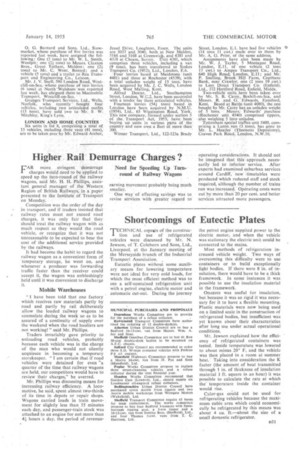Higher. Rail Demurrage Charges'?
Page 71

If you've noticed an error in this article please click here to report it so we can fix it.
Need for Speeding Up Turnround of Railway Wagons CAR more stringent demurrage I. charges would need to be applied to speed up the Min-round of the railway wagons, said Mr. H. H. Phillips, assistant general manager of the Western. Region of British Railways, in a' paper presented to the Institute of TranspOrt on Monday..
Competition was the order of the day in transport, and if traders insisted that railway rates must not exceed road charges, it was only fair that' they should treat the railway wagon with as much respect as they would the road vehicle, or recognize that it was not unreasonable to be expected to bear the cost of the additional service provided by the railways.
It had become the habit to regard the railway wagon as a convenient.form of temporary storage, he went on, and whenever a producer was forwarding traffic faster than the receiver could accept it, the wagon was unblushingly held until it was convenient to discharge it.
Mobile Warehouses "I have been told that one factory which receives raw materials partly by road and partly by rail deliberately allow the loaded railway wagons to acumulate during the week so as to be assured of a continuity of supply over the weekend when the road hauliers are not working! "said Mr. Phillips.
Traders invariably gave priority to unloading road vehicles, probably because each vehicle was in the charge of the man who would not silently acquiesce in becoming a temporary storekeeper. "I am certain that if road vehicles were detained for even =a. quarter of the time that railway wagons are held, our competitors would have to review their charges," he averred.
Mr. Phillips was discussing means for increasing railway efficiency. A locomotive, he said, spent almost two-thirds of its time in depots or repair shops. Wagons carried loads in train movement for slightly less than 55 minutes each day, and passenger-train stock was attached to an engine for not more than 4.1 hours a day, the period of revenue,
earning movement probably being much smaller.
One way of effecting savings was to revise services with greater regard to
operating considerations. It should not be imagined that thisapproach neces
sarily led to inferior. service. After experts had examined suburban services around Cardiff, new timetables were produced which reduced staff and stock required, although the number of trains run was increased. OPerating costs were cut by more Than 20 per cent, and better services attracted more passengers.
















































































































